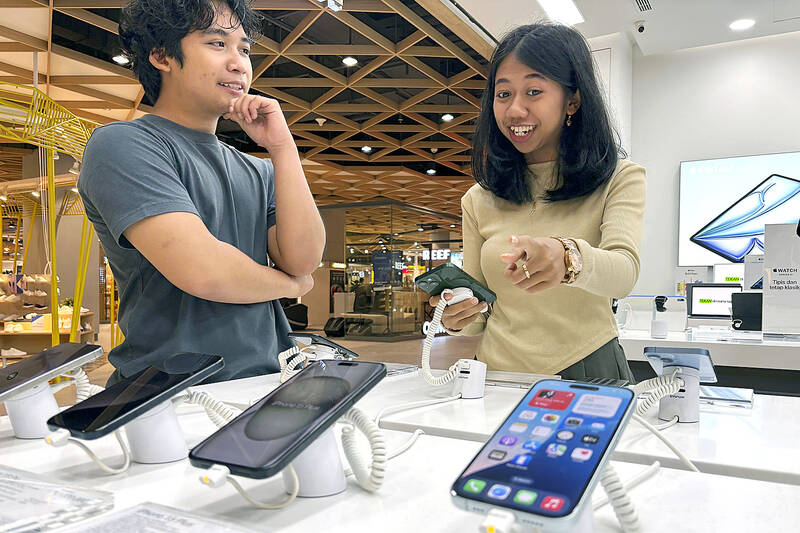Apple Inc has signed an agreement with Indonesia to invest in the country, paving the way for sales of the iPhone 16 to resume in Southeast Asia’s largest nation.
The agreement was announced yesterday by Indonesian Minister for Industry Agus Gumiwang Kartasasmita in a media briefing in Jakarta. The ministry would begin a process to issue Apple with a permit allowing it to sell its latest smartphone, news outlet Kompas reported.
The pact is set to end a five-month tussle that started in October last year after Indonesia refused to issue a sales permit to Apple, citing its failure to comply with domestic manufacturing requirements for smartphones and tablets.

Photo: EPA-EFE/MADE NAGI
Apple then pledged to invest US$1 billion in Indonesia, an offer Indonesian President Prabowo Subianto directed his ministers to accept. However, the Ministry of Industry last month unexpectedly upheld the ban, as it sought better terms.
The deal is a win for Indonesia, with its hardball tactics paying off to get a major foreign company to invest more to develop its goods in the country and boost local manufacturing, instead of merely using the nation as a sales hub.
The government had previously said that Apple had invested only about US$95 million in Indonesia.
The agreement also comes at an opportune time for Prabowo. The optics of a US tech giant yielding to his administration could be used to boost his domestic standing, which has taken a hit following multiple policy U-turns that have generated confusion. On top of that, his plan for sweeping spending cuts that threatened jobs and scholarships triggered days of protests last week.
For Apple, the deal gives it access to Indonesia’s massive consumer market at a time when sales in China have slowed. Though Apple ranks outside the top five smartphone brands in Indonesia, the country’s population of 278 million people — more than half of whom are under the age of 44 and tech-savvy — is too good an opportunity to miss.
The agreement includes the establishment of a plant on the Indonesian island of Batam to produce AirTags, a device that allows users to track their luggage, pets or other belongings, according to Kartasasmita. Apple is bringing on board one of its significant suppliers, Luxshare Precision Industry Co (立訊精密), to operate the plant.

With this year’s Semicon Taiwan trade show set to kick off on Wednesday, market attention has turned to the mass production of advanced packaging technologies and capacity expansion in Taiwan and the US. With traditional scaling reaching physical limits, heterogeneous integration and packaging technologies have emerged as key solutions. Surging demand for artificial intelligence (AI), high-performance computing (HPC) and high-bandwidth memory (HBM) chips has put technologies such as chip-on-wafer-on-substrate (CoWoS), integrated fan-out (InFO), system on integrated chips (SoIC), 3D IC and fan-out panel-level packaging (FOPLP) at the center of semiconductor innovation, making them a major focus at this year’s trade show, according

DEBUT: The trade show is to feature 17 national pavilions, a new high for the event, including from Canada, Costa Rica, Lithuania, Sweden and Vietnam for the first time The Semicon Taiwan trade show, which opens on Wednesday, is expected to see a new high in the number of exhibitors and visitors from around the world, said its organizer, SEMI, which has described the annual event as the “Olympics of the semiconductor industry.” SEMI, which represents companies in the electronics manufacturing and design supply chain, and touts the annual exhibition as the most influential semiconductor trade show in the world, said more than 1,200 enterprises from 56 countries are to showcase their innovations across more than 4,100 booths, and that the event could attract 100,000 visitors. This year’s event features 17

SEMICONDUCTOR SERVICES: A company executive said that Taiwanese firms must think about how to participate in global supply chains and lift their competitiveness Taiwan Semiconductor Manufacturing Co (TSMC, 台積電) yesterday said it expects to launch its first multifunctional service center in Pingtung County in the middle of 2027, in a bid to foster a resilient high-tech facility construction ecosystem. TSMC broached the idea of creating a center two or three years ago when it started building new manufacturing capacity in the US and Japan, the company said. The center, dubbed an “ecosystem park,” would assist local manufacturing facility construction partners to upgrade their capabilities and secure more deals from other global chipmakers such as Intel Corp, Micron Technology Inc and Infineon Technologies AG, TSMC said. It

EXPORT GROWTH: The AI boom has shortened chip cycles to just one year, putting pressure on chipmakers to accelerate development and expand packaging capacity Developing a localized supply chain for advanced packaging equipment is critical for keeping pace with customers’ increasingly shrinking time-to-market cycles for new artificial intelligence (AI) chips, Taiwan Semiconductor Manufacturing Co (TSMC, 台積電) said yesterday. Spurred on by the AI revolution, customers are accelerating product upgrades to nearly every year, compared with the two to three-year development cadence in the past, TSMC vice president of advanced packaging technology and service Jun He (何軍) said at a 3D IC Global Summit organized by SEMI in Taipei. These shortened cycles put heavy pressure on chipmakers, as the entire process — from chip design to mass